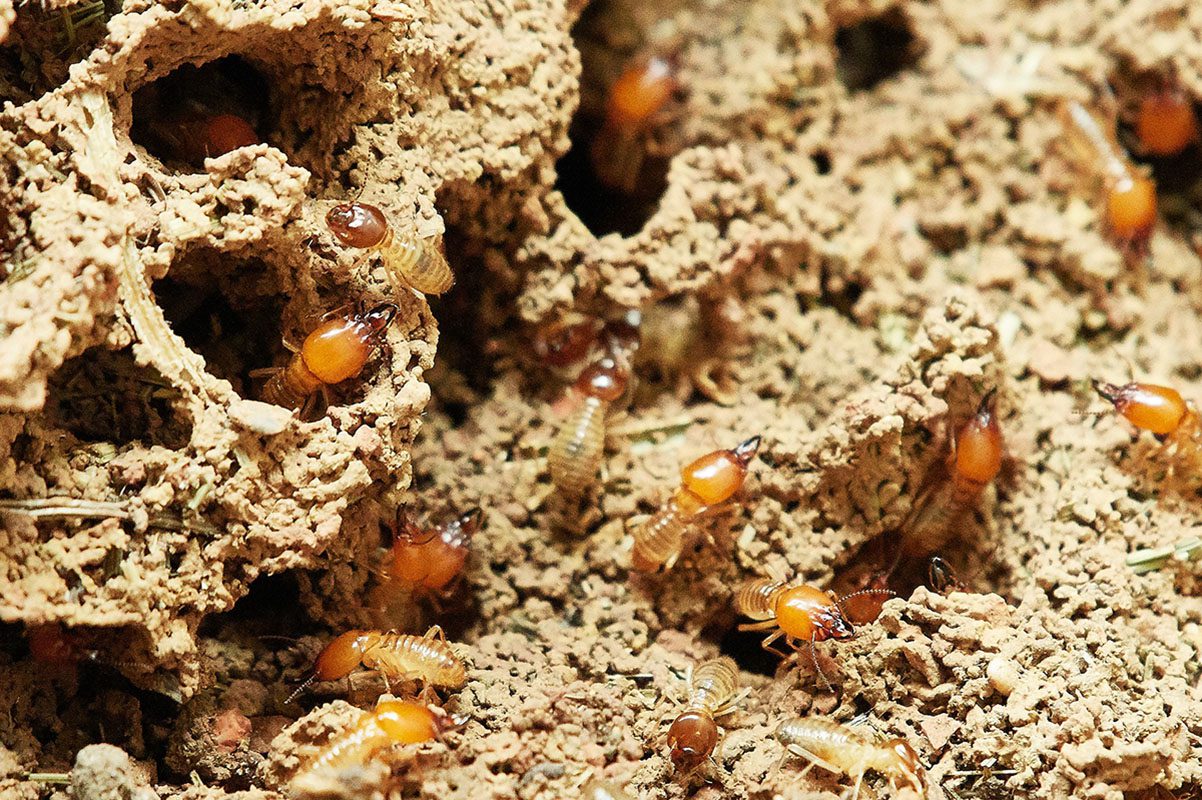

From Fees to Freedom: Richr’s Game-Changing Wealth Strategy in Real Estate, by Jason Rubin, and Glenn Orgin
Have you ever thought about why it costs 6% to…
January 9, 2024
Table of Contents:
Before purchasing a home, a pest inspection is highly recommended. In places like Florida, where termites are common, it’s essential to know what to look for and understand the pest inspection and extermination processes. This article provides helpful insight into the many components of pest inspection, including how long they take and who usually covers the costs. Termite inspections can save buyers thousands of dollars in the long run.
We provide you a free home valuation and a breakdown of your closing costs to show you how much you will save and the amount of cash you will receive at closing
Or Call Us +1844-957-4247
When buying or selling a home, home inspections for pests can offer details on any infestations and damage done to the property. These pests can cause costly damage, especially termites. Pest inspections are not included in a general home inspection and are often required as a separate, specialized inspection before closing.
A pest inspection looks for bugs and other insects or animals that cause damage to the structural integrity of a house, causing a health hazard or general damage. For example, termites cause harm to the wood structure of the home, so they need to be exterminated quickly.
Most pest inspectors will look for these creatures in your home.
Most inspections occur around the same time the general inspection occurs and may be required as part of the appraisal. Homeowners can attempt to exterminate any pests on their own, but it is recommended to hire a professional in cases where the sale of a home is at stake.
When an inspector evaluates your house for pests, they will look for damage in floorboards, baseboards, siding, and walls to see if they can get pests to come out from their hiding places. After the inspector has finished, they will offer a pest inspection report and give it to the appraiser. Not all states require inspectors to search for the same creatures. It varies by climate and the creatures that live in those elements.
The inspector will provide a brief overview of what they have found and the damage they can see and then recommend exterminating the creatures and fixing any damages. In most cases, if there are pests or damages, the issue will have to be resolved before a loan can be secured against the property.
Termite inspections are part of the pest inspection as the insects can be incredibly damaging.
For example, a home is ten times more likely to be damaged by termites than by flood or fire.
These termites are common and will leave pencil-sized mud tubes usually at the base of a structure, such as on the concrete foundation of a home. They live in soil, infesting from the ground up, travel in the mud tubes, and hide inside the wood. They need very moist environments to survive. In some parts of the country, they can be found seasonally, and in others, they thrive year-round.
These types of termites are prevalent in Florida. Drywood termites live above ground in the wood in and around your home.
Drywood termites are small insects that are difficult to find. They live inside the wood, and they are rarely seen. Drywood termites live in colonies that are usually fewer than 1,000 insects. Compared to subterranean termites, they can be widely separated within a home and take years to fully mature.
The areas of a home where drywood termites can be found include:
Here are four signs that drywood termites may be inside your home.
Hollow or visibly damaged wood that looks like a honeycomb or is carved out.
An inspector looks for signs of the termites at places on the house they could potentially enter and offer solutions as part of their inspection report.
Most inspections will take between thirty minutes to an hour to complete. This is dependent on the size of the house and if there are any spaces such as a crawlspace or attic that are more challenging to reach. These circumstances make the inspection take longer.
Once the inspection report is complete, it may take the mortgage company a day or two to process. Sometimes, if the damage is severe, another inspection is required once the pests have been cleared and repairs are completed. This confirms that all issues have been resolved before the mortgage is approved.
A termite inspection looks for wood-destroying organisms and involves inspecting rotten wood and looking for insects that damage wood.
Home sellers can prepare for a termite inspection in several ways.
It’s time to buy smarter. Richr gives you cash back helping you buy the home of your dreams.
You’ll get a full-service concierge agent.
You’ll get cash back at closing.
We will support you with your title and homeowners insurance need.
Call us now on 1-844-957-4247 or Start Searching Your Home Now!
A termite inspection costs $75 to $150. A termite clearance letter or inspection report can cost $100 to $200.
Termite inspections can be seen by the eye when the wood in a home has been damaged internally or externally. The inspector looks through all areas of the home’s interior and exterior.
The inspector will go into all crawl spaces, basements, attics, or similar spaces within the home. They will also check your baseboards, window, doors, and other locations. In addition, an inspector will look at the plumbing in bathrooms, kitchens, and utility rooms. This is because termites use the pipes to enter the home and begin invading your wood.
Next, the inspector will walk around the house’s exterior, looking into cracks or crevices, insect mud tubes, and damage to any exterior wood structures. After the external inspection is complete, the inspector will check out neighboring yards to determine if there are any signs of termite activities.
A termite letter is also known as a wood infestation inspection report or wood destroying organisms report. This letter reports on termites in, under, and around the house.
After an inspector performs the inspection, there will be one of two outcomes: they will declare the home termite-free and give the homeowner a termite letter, or they will treat the home for termites, after which the homeowner can decide whether to purchase a termite bond. Some loans require a termite letter. In some cases, homeowners can request that the seller deals with the termites.
A termite bond is a contract between homeowners and pest control companies that acts as an insurance policy against termites. The terms can be customized per customer and often include reimbursing the homeowner for repairing direct termite damage or covering future treatments.
When buying a house in areas prone to termites, it is important to have a new termite bond or letter or access to a recent bond or letter. If there is a recent letter, it will be listed on the seller’s disclosure.
A termite bond is not always a requirement, so it may be up to the homeowner to decide to move forward with the inspection and bond—usually, an annual inspection as part of the bond to keep termite issues under control.
To create a termite bond, a termite company considers these factors:
The pest control company will also discuss with the homeowner if they need a termite warranty on the house and future inspections. A termite bond’s cost will vary based on the homeowner’s coverage.
The cost of the bond does not cover inspections for bed bugs, ants, beetles, and other pests that could cause additional costs in the future. It also does not cover damage that leads to termite infestations, such as water damage.
It only covers the extermination of the termites and damage that occurs directly from the termites.
Yes, they are required in Florida. Florida is a state where termites are prevalent, so it is important to perform a termite inspection regularly. A termite inspection in Florida is called a Termite and Other Wood Destroying Organism Report (WDO Report). It is required and strongly recommended when buying a house. The inspector must have an ID card issued from the Department of Agriculture and Consumer Services (DACS) to perform an inspection. This is a unit of the Florida DACS, the Bureau of Entomology and Pest Control.
It’s time to buy smarter. Richr gives you cash back helping you buy the home of your dreams.
You’ll get a full-service concierge agent.
You’ll get cash back at closing.
We will support you with your title and homeowners insurance need.
Call us now on 1-844-957-4247 or Start Searching Your Home Now!
In most cases, the seller will cover the cost of a pest inspection. Covering this cost can help both the buyer and seller identify any present issues, lowering stress in the long run. Depending on the lender’s requirements, a termite inspection may be completed within 30 to 90 days of closing.
A pest inspection is recommended before buying a home, especially in termite-prone parts of the country like Florida, where an inspection is required by law. The seller usually covers the inspection cost and, most often, the extermination costs. Getting a termite inspection can save buyers thousands of dollars in the long run.
If you’re looking to buy or sell a house and would like to discuss your option, Richr can help you!
Our fully licensed Concierge Team is here to questions and provide free, objective advice on how to get the best outcome with your sale and purchase.
Ready to get started?
Call us now on 1-844-957-4247 or enter your basic info
below. Our concierge Team will be in touch shortly to help.
Remember, this service is 100% free and there’s never any obligation.


If you want the Richr team to help you save thousands on your home just book a call.

